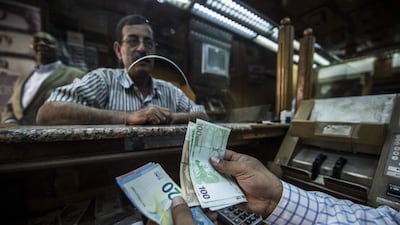In the past few days, I have walked around the streets of downtown Cairo inquiring into the price the Egyptian pound. One licensed money changer I went to advertised that it would buy dollars for 18.70 pounds and sell them for 18.80. But only a few doors down the street, an unlicensed man was offering 19.50 to buy and 20.50 to sell. At commercial banks, the rate was around 18.00.
Now this doesn’t make sense. If I were to buy dollars from the licensed dealer for 18.80 pounds and sell them to the black market dealer a few steps away for 19.50, I could make a tidy little profit.
But when I asked, the licensed changer said that unfortunately it didn’t have any dollars for sale. Prying dollars out of banks is no easy task either.
Until November 3, when it announced it was floating the currency, the central bank had been maintaining an official peg of around 8.88 pounds to the dollar. Could the central bank have been quietly telling bankers in recent days not to let the currency weaken further? Perhaps it has been getting nervous as the pound hovers around the psychological barrier of 20 to the dollar.
This case of nerves is not surprising. Consumer prices surged by an annual 19 per cent in November, and people are blaming it, somewhat unfairly, on the currency flotation.
The central bank should resist the urge to intervene. The main task of the government now is building confidence in the currency, much of which was lost over the past six years after capital controls were introduced to support the pound, making it hard for people to buy dollars.
The currency controls and disappearing dollars left many people scrambling for funds to pay for foreign expenses such as imports, travel, repayments of foreign debt or tuition for their children studying abroad. Since then, businesses and wealthier Egyptians have been holding a serious amount of their cash in dollars, and they are unlikely to switch them back until they are sure the pound is once again fully convertible.
Foreigners who might be tempted to invest in Egypt have similar fears. No one wants to buy pounds unless they are confident they can convert them back sometime down the road. One investor who brought a million dollars into the country just before the 2011 uprising told me he had to fight the bureaucracy for six months before he could get them out again.
At some point soon, the devaluation will start doing its trick, and Egypt’s current account deficit will begin narrowing. Egyptians will begin buying fewer imports, which the devaluation has made more expensive, and foreigners will begin buying more Egyptian exports, which the devaluation has made more attractive.
As confidence increases, investors and others will switch into pounds.
There are other confidence-boosting measures the government could take. One would be to give the IMF the go-ahead to publish the staff report that its team wrote up last year, as well as the text of the US$12 billion IMF loan agreement signed on November 11. In other countries these are normally published within weeks of signing. The IMF said on December 19 it expected the staff report to be published shortly, but two weeks have passed since then and nothing has appeared on its website.
Investors in particular are concerned as to how Egypt will finance its massive budget deficit, which in the fiscal year to end-June 2016 was equal to 40 per cent of all government spending, or 12.3 per cent of GDP. The fear is that the government could be forced to print more money. M2 money supply skyrocketed by 38.8 per cent in the year to end-November, although much of this was caused by the increase in the Egyptian pound value of foreign currency deposits in banks following the flotation.
M1, which doesn’t include foreign currency, grew by a still worrisome 20.7 per cent. Faster money supply growth means higher inflation and a continually weakening pound.
Suspicions are that the government may introduce new real estate and capital gains taxes and further increases in fuel prices to help plug the deficit. Although news of this would anger long-suffering Egyptian consumers, it would please investors and thus increase demand for Egyptian pounds.
The whole point of the IMF agreement, the devaluation and the austerity measures was to win credibility, but much of this could be lost if the agreement is not made public.
Egypt’s policymakers would be doing the country a world of good if they would publish the programme while allowing the pound to slide until supply meets demand. They could then sit back and enjoy its inevitable bounce.
Patrick Werr has worked as a financial writer in Egypt for 26 years.
business@thenational.ae
Follow The National's Business section on Twitter

